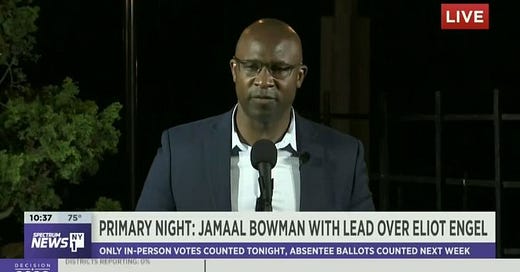Welcome to a very exciting midweek edition of Progressives Everywhere!
Every weeknight, I fill a newsletter with headlines and analysis about stories that get overlooked most everywhere else. If you want the daily newsletter delivered right to your inbox, just sign up for the premium edition of Progressives Everywhere. On Wednesday, I send it out to everyone for free!
If 2018 was an earthquake, 2020 is proving to be the even more powerful aftershock.
We don’t have all the votes from yesterday’s Kentucky or New York primaries in yet, and we likely won’t for another week. In Kentucky, it’s too close to call. But if things hold as expected, there will be a lot to celebrate in NY, including:
Jamaal Bowman dethroning 30-year incumbent Rep. Eliot Engel in NY-16;
Mondaire Jones (a Progressives Everywhere favorite and endorsee!) surging to win NY-17 against a field that included several well-known legislators and millionaire pharmaceutical heir;
Ritchie Torres pulling it out against Bronx boss and noted homophobe Ruben Diaz Sr. in NY-15;
We’re still waiting on ballots in NY-12, which is too close to call at the moment.
It’s hard to overemphasize just how drastically New York politics has changed over the last four years. In 2014, Andrew Cuomo was just being re-elected to his second term as governor, Republicans and the turncoat IDC controlled the State Senate, and Bill de Blasio was bowing down to police unions. It was a blue state, but one darkened by the shadow of machine corruption.
Then, in 2018, progressives weaponized the primary: Alexandria Ocasio-Cortez pulled off a shocking victory over the powerful Queens Democratic Party boss, Rep. Joe Crowley, and six real Democrats knocked off IDC members to reclaim control of the State Senate. In 2019, democratic socialist Tiffany Cabán came thisclose to pulling off another stunner in Queens in her race for District Attorney.

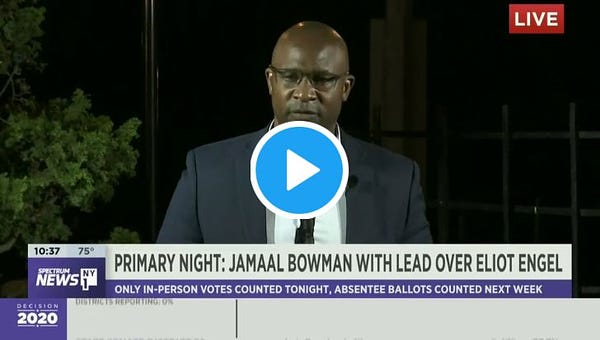
You’d think that the state Democratic Party would have started to feel the heat and been ready for the obvious second wave coming this election season. But no. Instead, Eliot Engel (NY-16) continued to stay the course; other than backing Medicare for All and the Green New Deal when it was clear neither could pass, he stayed his old conservative self, especially on foreign policy and campaign contributions. He opposed pulling troops out of Afghanistan at all costs, backed a foreign policy only Netanyahu could love, went to town on Ilhan Omar, and continued taking gobs of money from Wall Street, which he’d voted to deregulate.
Engel also steered clear of his district during the coronavirus pandemic (makes sense; he once tried to get tax breaks for living in Maryland) and got caught on a hot microphone saying that he wouldn’t care about talking in his district if he weren’t being primaried.
The victories weren’t limited to Congress, either. If things stay on track, there will be several huge victories in the state legislature, as well, including:
Jessica González-Rojas successfully primarying Assemblyman Michael DenDekker in Queens’ AD-34;
Zohran Mamdani pulling out a win over (the relatively progressive) Assemblywoman Aravella Simotas in Astoria’s AD-36;
Democratic socialist Jabari Brisport, a former city council candidate, winning an open State Senate seat, SD-25;
And incumbent Assemblywoman Yuh-Line Niou blowing away a Wall Street-funded primary challenger with a terrible ad game in lower Manhattan’s AD-65.
If Gov. Cuomo continues to push for big budget cuts and refuses to tax the rich, he’ll feel even more pushback now; clearly the progressive wing of the party is ascendant and increasingly confident.
That said, I understand and respect that there will always be moderate Democrats across the country — I just don’t think they should represent safe blue districts. Engel’s district shifted mightily over the years, both in demographics and political attitudes. Bowman, Jones, and Torres’s districts are some of the bluest in the country — in fact, Torres’s ranks #1 — so they’re guaranteed to elect a Democrat. Party leaders frequently come from these safe districts, and since party leaders so often set the Dems’ priorities, having as many progressives in those seats is essential.

Georgia Republicans try to pull a fast one:
We’ve been following the various modest attempts at police and voting reform that Georgia Republicans are grudgingly pursuing and the more damaging legislation they’re pushing at the same time.
On the police side, the legislature passed a bill that allows counties to disband their policies departments (which will have limited impact) and a hate crimes bill that catches the state up with 46 others. On Tuesday, the GOP narrowly passed a bill that would provide more protections for police officers in a state where cops just murdered Rayshard Brooks.
The absurd bill, which passed only after acrimony on the floor, is jaw-dropping. According to the local news source Georgia Recorder, the bill “allows a police officer to sue any person, group or corporation who, for example, files a false complaint against them or abridges their civil rights.”
As one Democrat put it, this is basically double qualified immunity.
On the voting side, the efforts have been even more half-hearted. After the disastrous election day a few weeks ago, we spoke to the Democrats’ former voter suppression prevention director Sara Tindall Ghazal, who is running for legislature and put forth a comprehensive proposal to reform the election system. GOP Secretary of State Brad Raffensperger’s proposals fell far short, as he announced a few small measures that included more technicians to help districts with the malfunctioning voting machines that he and Gov. Brian Kemp insisted on buying for $110 million.
During the press conference announcing those reforms, Raffensperger said he would not be sending out absentee ballot applications, as he had for the primaries; instead, he’d put up a website that voters could use to request one (when has technology ever failed them?). And now, the State Assembly just gutted a positive voting reform bill and subbed in a clause that would explicitly ban local government officials from sending applications themselves.


As you might expect, this will disenfranchise lots of Georgians, especially those in poorer counties and people without reliable broadband access.
I’d read the whole story, but this part sums it up:
Democrats, including Rep. Renitta Shannon (D-Decatur), said that the House Republicans’ push to preemptively prevent mass-mailing of applications would be making it harder on voters and elections officials alike.
“This ties the hands of local governments, if they want to do that, to help in their elections – and all we’ve heard for the last two days has been: 'The county needs to get it together,'” she said. “And this is something that the counties want to do in order to assist.”
Third-party groups, political parties and others can still send applications to voters but, if the bill passes, then the onus would be on the voter to return a completed application or use the online portal. When asked by another representative if allowing some counties to mail applications while others did not would create disparities between voting, Shannon said that was already the case.
“There are some counties that said they didn't have money for drop boxes [to return absentee ballots] so they just didn't have drop boxes,” she said. “There were other counties that put additional money for drop boxes, so we already have a lack of uniformity.”
Fuck:
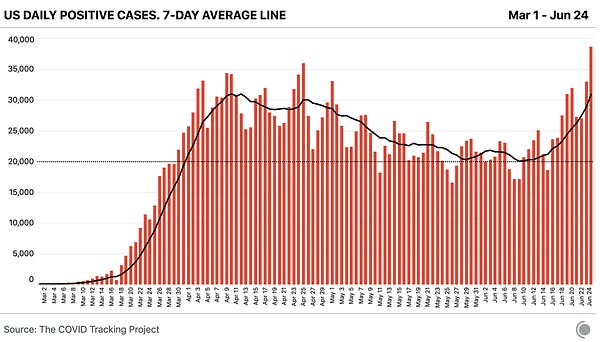
You Go, Idaho:
Idaho is about as deep-red as it gets when it comes to federal elections, but something interesting is happening out in the rural grassroots.
In 2018, a progressive group called Reclaim Idaho managed to convince 62% of Idahoans to vote yes on Medicaid expansion in the same election in which Republicans swept statewide offices by 20 points apiece. It was a resounding victory that suggested a lefty populism could work even in these deep Republican states. (I should note that I wrote about their campaign in June of 2018 and Progressives Everywhere helped raise some money for them.)
Instead of resting on their laurels, Reclaim Idaho regrouped and is now pushing for a ballot amendment that would boost K-12 education funding by $170 million and pay for it by raising the state’s corporate tax rate and instituting a wealth tax.
The coronavirus pandemic has crushed a lot of voter initiative drives nationwide by making it impossible to gather enough signatures to qualify for the ballot. Reclaim Idaho also saw their efforts thwarted by the shelter-at-home orders — the order in Idaho was lifted on April 30, the same day as the petition deadline — but instead of packing it in, they’ve sued for an extension and the right to collect the rest of their signatures online.
Groups in other states have had mixed luck with this tactic so far this year (see: Ohio), but on Tuesday, a judge ruled in Reclaim Idaho’s favor: U.S. District Court Judge B. Lynn Winmill (sweet name) said that Republican Secretary of State Lawerence Denney can either put the initiative directly on the ballot or give Reclaim more time and the right to collect digital signatures.
Michigan is doing something cool:
Speaking of ballot initiatives, Michigan voters in 2018 approved a whole raft of them, including one that would create an independent redistricting system to prevent heinous (GOP) gerrymanders. Now that a bogus (GOP) lawsuit to stop it has been dismissed (we covered it Monday), the state is moving forward with its quirky new system.
It’ll be an independent *citizens* redistricting commission, which means that not only are lobbyists and people with connections to state lawmakers banned from participating, the actual members will be drawn from a lottery. The state received nearly 10,000 applications, which is pretty cool, and they’re in the process of choosing the members now.
Michigan Secretary of State Jocelyn Benson is turning it into a bit of a public game show/civics lesson, which is a breath of fresh air considering how little people trust government. The commission will have four Democrats, four Republicans, and five unaffiliated members, so it’s not purely a game of chance, but it’s still a lot* of fun to watch happen.

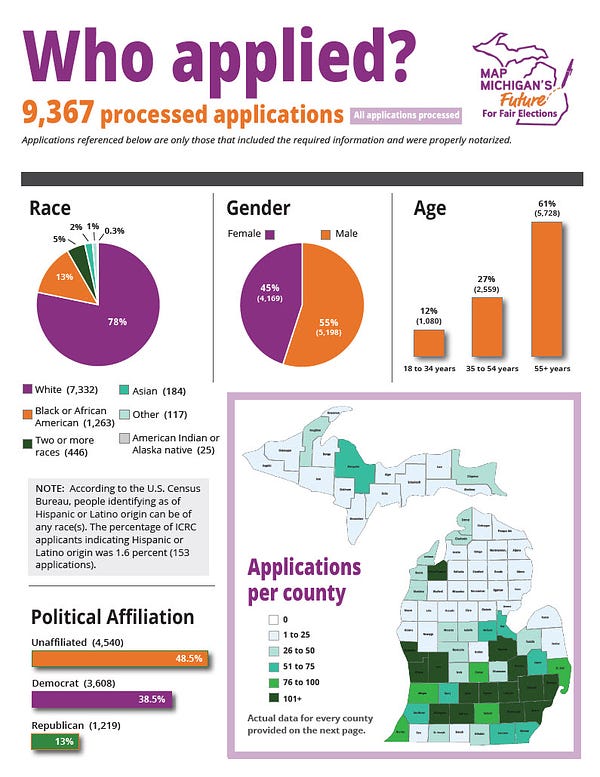
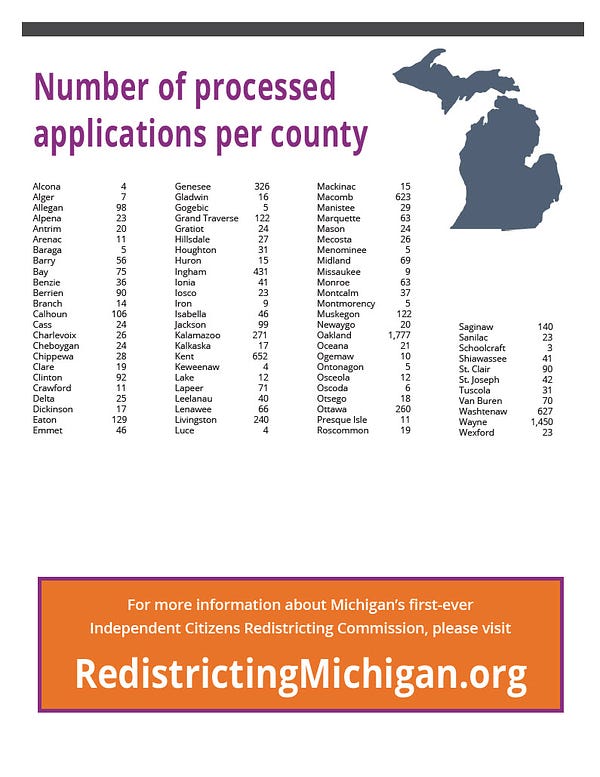
*relative to other bureaucratic decisionmaking processes, let’s be clear.
A note about our crowdfunding campaign: Progressives Everywhere will always be a free newsletter. Together we've raised over $1 million for progressives candidates and causes and over $1.5 million for bail funds and grassroots community groups! We’ve grown so much that it costs $100 just to send this email, and there are other costs as well.
We’re now sending out daily news editions of the newsletter, filled with important news, undercovered stories, electoral analysis, and everything else you need to stay ahead of the curve in this intense time. It costs just $5 a month.
To help support the cause, you can also make donations at GoFundMe (you’ll be thanked in future public editions of the newsletter).

